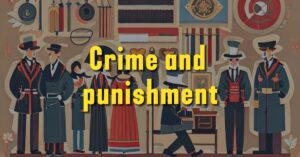This vocabulary list is for reference only. Your Lexical Resource scores are calculated based on the overall level of vocabulary used in your writing and speaking answers. To improve your Lexical Resource scores, it is necessary that you improve your overall level of vocabulary.
However, skillfully incorporating these words in your writing and speaking answers together with a good vocabulary level will increase the chance of enhanced Lexical Recourse scores.
Words and phrases
| Word/Phrase | Type | Meaning | Example |
|---|---|---|---|
| Adjudicate | Verb | To make a formal judgment or decision in a legal case | The judge will adjudicate the dispute between the parties. |
| Appellate court | Noun phrase | Higher court that reviews decisions of lower courts | The appellate court overturned the lower court’s decision. |
| Circumstantial evidence | Noun phrase | Evidence that suggests a fact but does not prove it directly | The case relied heavily on circumstantial evidence. |
| Conviction | Noun | A formal declaration of guilt by a court | The defendant’s conviction was based on compelling evidence. |
| Disbar | Verb | To remove someone from the practice of law | The unethical conduct led to the lawyer being disbarred. |
| Exoneration | Noun | The action of officially absolving someone from blame | The exoneration came after new evidence was discovered. |
| Extradition | Noun | The surrender of an accused or convicted individual to another jurisdiction | The extradition process involves complex legal procedures. |
| Grand jury | Noun phrase | A panel of citizens that reviews evidence and decides whether to indict a suspect | The grand jury returned an indictment against the defendant. |
| Impartial | Adjective | Not biased or prejudiced | The judge ensured an impartial trial by excluding biased jurors. |
| Indictment | Noun | A formal charge or accusation of a serious crime | The indictment was handed down by the grand jury. |
| Jurisprudence | Noun | The theory or philosophy of law | Studying jurisprudence helps understand legal principles. |
| Mitigating circumstances | Noun phrase | Factors that may reduce the severity of a punishment | The judge considered the defendant’s remorse as a mitigating circumstance. |
| Perjury | Noun | The offense of willfully lying under oath | The witness was charged with perjury for providing false testimony. |
| Pro bono | Adjective | Done or undertaken without charge, especially for the public good | The lawyer offered pro bono legal services to low-income clients. |
| Racketeering | Noun | The operation of an illegal business for personal profit | The organization was involved in racketeering and money laundering. |
| Restitution | Noun | Compensation or payment for damages or losses | The court ordered the defendant to pay restitution to the victims. |
| Subpoena | Noun/Verb | A writ ordering a person to attend a court | The attorney subpoenaed the witness to testify at the trial. |
| Testimony | Noun | A formal written or spoken statement given under oath | The witness provided compelling testimony during the trial. |
| Vicarious liability | Noun phrase | Legal responsibility for the actions of another | Employers can be held vicariously liable for their employees’ actions. |
| White-collar crime | Noun phrase | Nonviolent crimes typically committed by business professionals | The investigation uncovered a complex network of white-collar crime. |
Common types of crimes
| Word/Phrase | Type | Meaning | Example |
|---|---|---|---|
| Arson | Noun | Deliberate setting fire to property | Arson is a serious crime that endangers lives and property. |
| Assault | Noun | Act of inflicting physical harm or injury | Assault can range from minor altercations to serious attacks. |
| Burglary | Noun | Unlawful entry into a building to commit theft or felony | Burglary involves breaking into homes or businesses. |
| Cybercrime | Noun | Criminal activity conducted through digital means | Cybercrime includes hacking, identity theft, and online fraud. |
| Domestic violence | Noun phrase | Abuse or violence within a domestic or intimate relationship | Domestic violence survivors often require support and protection. |
| Drug trafficking | Noun phrase | Illegal distribution and sale of controlled substances | Drug trafficking is a serious offense with severe penalties. |
| Embezzlement | Noun | Theft or misappropriation of funds by a person entrusted with them | Embezzlement occurs when someone abuses their position of trust. |
| Fraud | Noun | Deception for financial or personal gain | Fraudulent schemes often target unsuspecting individuals. |
| Hate crime | Noun phrase | Criminal offense motivated by bias or prejudice | Hate crimes target individuals based on race, religion, or other factors. |
| Homicide | Noun | Killing of one person by another | Homicide investigations require thorough examination of evidence. |
| Human trafficking | Noun phrase | Exploitation of people for forced labor, sexual slavery, or commercial sex | Human trafficking is a violation of basic human rights. |
| Identity theft | Noun phrase | Unauthorized use of someone else’s personal information | Identity theft can have devastating financial consequences. |
| Kidnapping | Noun | Unlawful abduction or holding hostage | Kidnapping cases require swift law enforcement action. |
| Money laundering | Noun phrase | Concealing the origins of illegally obtained money | Money laundering facilitates criminal activities by hiding proceeds. |
| Robbery | Noun | Theft involving force, violence, or intimidation | Robbery is a violent crime punishable by law. |
| Terrorism | Noun | Use of violence or intimidation for political or ideological purposes | Counterterrorism efforts aim to prevent acts of terrorism. |
| Theft | Noun | Act of stealing property without consent | Theft is a common property crime. |
| Vandalism | Noun | Willful destruction of property | Vandalism often results in damage to public or private property. |
Idioms for speaking
| Idiom | Definition | Example |
|---|---|---|
| Behind bars | In prison or jail; incarcerated. | “The thief was behind bars for stealing from multiple stores.” |
| Caught red-handed | Caught in the act of committing a crime, typically with evidence. | “The thief was caught red-handed on surveillance camera stealing from the store.” |
| Get away with murder | To avoid punishment for a serious offense. | “It seems like wealthy individuals often get away with murder.” |
| Get off scot-free | To avoid punishment or consequences for one’s actions. | “He managed to get off scot-free due to a legal technicality.” |
| Go off the rails | To start behaving in a way that is reckless or deviant. | “He went off the rails and got involved in petty crime.” |
| Go straight | To stop engaging in criminal behavior and live an honest life. | “He decided to go straight and start afresh.” |
| In hot water | In trouble or facing difficulties. | “He found himself in hot water after being caught cheating.” |
| Nail someone | To catch or incriminate someone. | “The detectives finally nailed the suspect.” |
| Off the hook | Freed from obligation or punishment. | “He thought he was off the hook after the witness failed to testify.” |
| On the lam | Fleeing from law enforcement. | “The suspect went on the lam after escaping from prison.” |
| Pay one’s debt to society | To serve punishment for a crime. | “He spent years in prison paying his debt to society.” |
| Pay the piper | To face consequences for one’s actions. | “He finally had to pay the piper and serve time in prison.” |
| Serve time | To spend time in prison. | “He served time for robbery.” |
| Take the fall for | Accept blame for someone else. | “He decided to take the fall for his friend’s crime.” |
| Throw the book at | Impose the maximum punishment. | “The judge threw the book at the repeat offender.” |
| Turn oneself in | Surrender to authorities. | “He decided to turn himself in to the police.” |
| Walk the straight and narrow | Behave honestly and ethically. | “He resolved to walk the straight and narrow.” |
| White-collar crime | Non-violent professional crimes. | “The case involved large-scale white-collar crime.” |
Words and phrases
Adjudicate
Type: Verb
Meaning: To make a formal judgment or decision in a legal case
Example: The judge will adjudicate the dispute between the parties.
Appellate court
Type: Noun phrase
Meaning: Higher court that reviews decisions of lower courts
Example: The appellate court overturned the lower court’s decision.
Circumstantial evidence
Type: Noun phrase
Meaning: Evidence that suggests a fact but does not prove it directly
Example: The case relied heavily on circumstantial evidence.
Conviction
Type: Noun
Meaning: A formal declaration of guilt by a court
Example: The defendant’s conviction was based on compelling evidence.
Disbar
Type: Verb
Meaning: To remove someone from the practice of law
Example: The unethical conduct led to the lawyer being disbarred.
Exoneration
Type: Noun
Meaning: The action of officially absolving someone from blame
Example: The exoneration came after new evidence was discovered.
Extradition
Type: Noun
Meaning: The surrender of an accused or convicted individual to another jurisdiction
Example: The extradition process involves complex legal procedures.
Grand jury
Type: Noun phrase
Meaning: A panel of citizens that reviews evidence and decides whether to indict a suspect
Example: The grand jury returned an indictment against the defendant.
Impartial
Type: Adjective
Meaning: Not biased or prejudiced
Example: The judge ensured an impartial trial by excluding biased jurors.
Indictment
Type: Noun
Meaning: A formal charge or accusation of a serious crime
Example: The indictment was handed down by the grand jury.
Jurisprudence
Type: Noun
Meaning: The theory or philosophy of law
Example: Studying jurisprudence helps understand legal principles.
Mitigating circumstances
Type: Noun phrase
Meaning: Factors that may reduce the severity of a punishment
Example: The judge considered the defendant’s remorse as a mitigating circumstance.
Perjury
Type: Noun
Meaning: The offense of willfully lying under oath
Example: The witness was charged with perjury for providing false testimony.
Pro bono
Type: Adjective
Meaning: Done or undertaken without charge, especially for the public good
Example: The lawyer offered pro bono legal services to low-income clients.
Racketeering
Type: Noun
Meaning: The operation of an illegal business for personal profit
Example: The organization was involved in racketeering and money laundering.
Restitution
Type: Noun
Meaning: Compensation or payment for damages or losses
Example: The court ordered the defendant to pay restitution to the victims.
Subpoena
Type: Noun/Verb
Meaning: A writ ordering a person to attend a court
Example: The attorney subpoenaed the witness to testify at the trial.
Testimony
Type: Noun
Meaning: A formal written or spoken statement given under oath
Example: The witness provided compelling testimony during the trial.
Vicarious liability
Type: Noun phrase
Meaning: Legal responsibility for the actions of another
Example: Employers can be held vicariously liable for their employees’ actions.
White-collar crime
Type: Noun phrase
Meaning: Nonviolent crimes typically committed by business professionals
Example: The investigation uncovered a complex network of white-collar crime.
Common types of crimes
Arson
Type: Noun
Meaning: Deliberate setting fire to property
Example: Arson is a serious crime that endangers lives and property.
Assault
Type: Noun
Meaning: Act of inflicting physical harm or injury
Example: Assault can range from minor altercations to serious attacks.
Burglary
Type: Noun
Meaning: Unlawful entry into a building to commit theft or felony
Example: Burglary involves breaking into homes or businesses.
Cybercrime
Type: Noun
Meaning: Criminal activity conducted through digital means
Example: Cybercrime includes hacking, identity theft, and online fraud.
Domestic violence
Type: Noun phrase
Meaning: Abuse or violence within a domestic or intimate relationship
Example: Domestic violence survivors often require support and protection.
Drug trafficking
Type: Noun phrase
Meaning: Illegal distribution and sale of controlled substances
Example: Drug trafficking is a serious offense with severe penalties.
Embezzlement
Type: Noun
Meaning: Theft or misappropriation of funds by a person entrusted with them
Example: Embezzlement occurs when someone abuses their position of trust.
Fraud
Type: Noun
Meaning: Deception for financial or personal gain
Example: Fraudulent schemes often target unsuspecting individuals.
Hate crime
Type: Noun phrase
Meaning: Criminal offense motivated by bias or prejudice
Example: Hate crimes target individuals based on race, religion, or other factors.
Homicide
Type: Noun
Meaning: Killing of one person by another
Example: Homicide investigations require thorough examination of evidence.
Human trafficking
Type: Noun phrase
Meaning: Exploitation of people for forced labor, sexual slavery, or commercial sex
Example: Human trafficking is a violation of basic human rights.
Identity theft
Type: Noun phrase
Meaning: Unauthorized use of someone else’s personal information
Example: Identity theft can have devastating financial consequences.
Kidnapping
Type: Noun
Meaning: Unlawful abduction or holding hostage
Example: Kidnapping cases require swift law enforcement action.
Money laundering
Type: Noun phrase
Meaning: Concealing the origins of illegally obtained money
Example: Money laundering facilitates criminal activities by hiding proceeds.
Robbery
Type: Noun
Meaning: Theft involving force, violence, or intimidation
Example: Robbery is a violent crime punishable by law.
Terrorism
Type: Noun
Meaning: Use of violence or intimidation for political or ideological purposes
Example: Counterterrorism efforts aim to prevent acts of terrorism.
Theft
Type: Noun
Meaning: Act of stealing property without consent
Example: Theft is a common property crime.
Vandalism
Type: Noun
Meaning: Willful destruction of property
Example: Vandalism often results in damage to public or private property.
Idioms for speaking
Behind bars
Definition: In prison or jail; incarcerated.
Example: “The thief was behind bars for stealing from multiple stores.”
Caught red-handed
Definition: Caught in the act of committing a crime, typically with evidence.
Example: “The thief was caught red-handed on surveillance camera stealing from the store.”
Get away with murder
Definition: To avoid punishment for a serious offense.
Example: “It seems like wealthy individuals often get away with murder.”
Get off scot-free
Definition: To avoid punishment or consequences for one’s actions.
Example: “He managed to get off scot-free due to a legal technicality.”
Go off the rails
Definition: To start behaving recklessly or badly.
Example: “He went off the rails and got involved in petty crime.”
Go straight
Definition: To stop engaging in criminal behavior.
Example: “He decided to go straight and start afresh.”
In hot water
Definition: In trouble or facing difficulties.
Example: “He found himself in hot water after being caught cheating.”
Nail someone
Definition: To catch or incriminate someone.
Example: “The detectives finally nailed the suspect.”
Off the hook
Definition: Freed from obligation or punishment.
Example: “He thought he was off the hook after the witness failed to testify.”
On the lam
Definition: Fleeing from law enforcement.
Example: “The suspect went on the lam after escaping from prison.”
Pay one’s debt to society
Definition: To serve punishment for a crime.
Example: “He spent years in prison paying his debt to society.”
Pay the piper
Definition: To face consequences for one’s actions.
Example: “He finally had to pay the piper and serve time in prison.”
Serve time
Definition: To spend time in prison.
Example: “He served time for robbery.”
Take the fall for
Definition: Accept blame for someone else.
Example: “He decided to take the fall for his friend’s crime.”
Throw the book at
Definition: Impose the maximum punishment.
Example: “The judge threw the book at the repeat offender.”
Turn oneself in
Definition: Surrender to authorities.
Example: “He decided to turn himself in to the police.”
Walk the straight and narrow
Definition: Behave honestly and ethically.
Example: “He resolved to walk the straight and narrow.”
White-collar crime
Definition: Non-violent professional crimes.
Example: “The case involved large-scale white-collar crime.”











